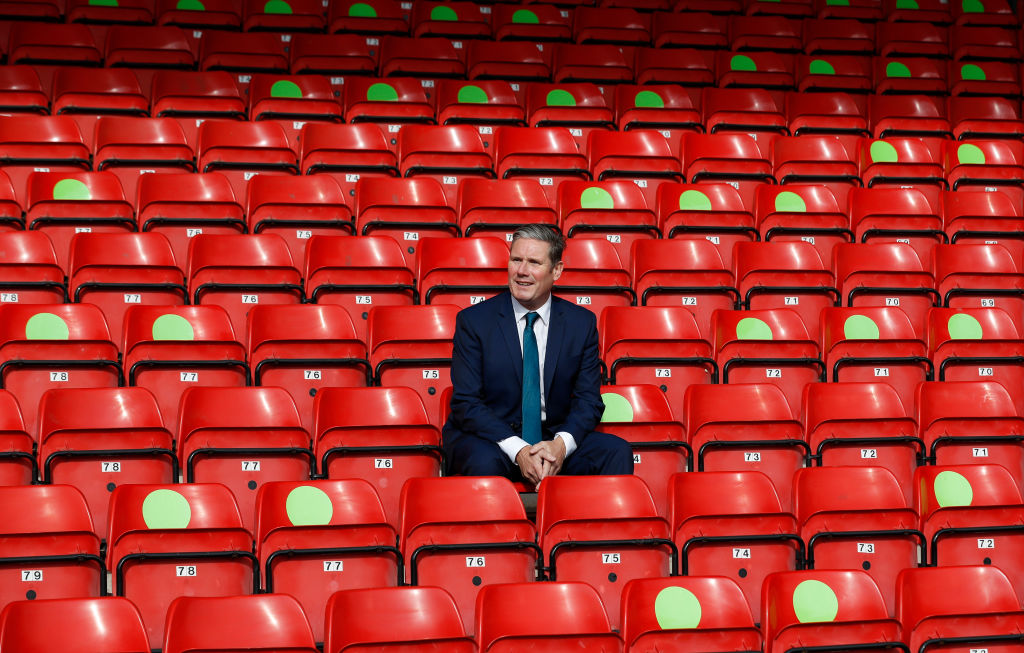Kemi Badenoch has come out against the Football Governance Bill, and not before time. In November 2021, Tracey Crouch, the former Tory sports minister, led calls for a football regulator in her ‘Fan-Led Review of Football Governance’, and in March 2022, Boris Johnson backed the plans. Once that muddy ball started rolling, even three changes of prime minister couldn’t stop it. Keir Starmer is seemingly as much in favour as his predecessors.
The enduring argument for a football regulator lies with the weird economics of professional football, which sees the majority of clubs spending well in excess of their regular revenue in the hope of winning trophies or promotion – or at least staving off relegation. It is by normal standards irresponsible behaviour, but it has characterised football for a very long time without the game collapsing. Nearly 60 years ago, Sir Norman Chester made the point about unbalanced football budgets in a report for the then Department of Education and Science. Yet all 92 teams that were in the Football League in the late 1960s survive today, even though some play at a lower level.
When the ‘fan-led’ review was published, Tracey Crouch made a fuss about Bury FC’s financial collapse and its consequent expulsion from the English Football League. They were the case that made her point. Bury had got into debt, couldn’t repay its creditors, and so the EFL booted them out the competition. This should never happen again! But while Bury’s troubles were probably distressing for fans, its effect on the rest of the football ecosystem were very limited, and, moreover, the club has now bounced back. It plays at its old ground in its old colours and attracts attendances in the North West Counties League Premier Division which are similar to those it attracted in the League. It will be back at a higher level very soon. Is everyone happy?
Well, no. The lesson our MPs learnt from this episode was, as it always is with politicians, that something must be done. And so we have the proposal for a fully-fledged ‘independent’ regulator, on similar lines to Ofcom or the Financial Conduct Authority. This regulator will lay down detailed conditions for ownership and management of professional clubs, will require annual business plans and frequent financial reporting, will limit the ability of clubs to spend in excess of defined revenue streams, and will have powers to change the management and temporarily take over the running of a club which is held to be in breach of its operating conditions. It will also have the ultimate power to take money from Premier League clubs and redistribute it to lower-league supplicants, a quite extraordinary taxation power for a non-government body to possess.
No other country in the world has a state-sanctioned regulatory body of this kind – and the international football authorities are rightly suspicious of government interference in football. The promoters of the bill have already had to back down on one proposal, to make the regulator pay obeisance to the foreign policy of the government of the day.
The new regulator will only have jurisdiction over the English league system. Football in Northern Ireland, Wales and Scotland can carry on as before even though, albeit on a lesser scale, they suffer from exactly the same overspending habit which afflicts English clubs. Scotland in particular has seen a far worse case of financial collapse than Bury: in 2012, one of the Scottish ‘big two’, Rangers, went into administration and the reformed club had to be placed in the fourth tier of Scottish football.
Starmer and Reeves have belatedly realised that excessive regulation raises costs, limits innovation and is a drag on growth
Scotland has rarely, if at all, been mentioned in the debate over football governance, which is revealing: the bill is fundamentally about clipping the wings of the English Premier League, the most successful football league in the world. A section of UK-based fans think their clubs have been hard done by, or have treated them badly. Lower-league clubs want a larger share of the revenues of the big clubs. Politicians see unpopular club owners and can’t resist a pile-on.
Regulation of an industry can make sense if there are problems of inadequate competition, if consumers are being demonstrably exploited, or if there are seriously damaging effects on other parts of the economy. None of these conditions apply to English football.
Keir Starmer and Rachel Reeves have belatedly realised that excessive regulation of the economy raises costs, limits innovation and is a drag on productivity and growth. The heads of the main regulatory bodies have recently been called in and read the Riot Act. With this in mind, it makes no sense to hog-tie one of our vanishingly few international success stories by imposing yet another busybody regulator.
Kemi Badenoch has no power to stop the Football Governance Bill, but on his next trip to the Emirates Sir Keir should listen to what Premier League leaders are saying about the likely unintended consequences of heavy-handed and unnecessary intervention: a reduction in competitiveness, a block on aspiration and a decline in the attractiveness of the competition to top international footballers. He should then go away, think about it for a day or two and then scrap or significantly water down the bill. Please.







Comments